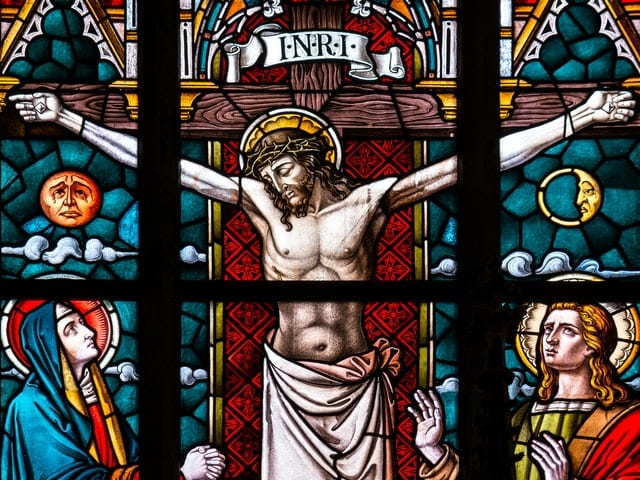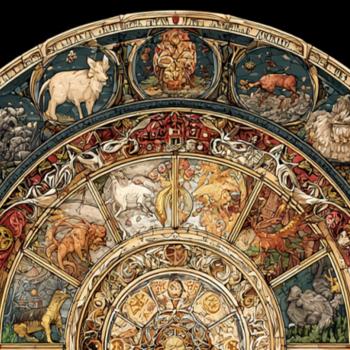
As we rethink the cross and question the theological assumptions of Penal Substitutionary Atonement, the question “Why did Jesus have to die?” begins to come into sharper focus for us. We can see how our sins did not truly separate us from God and how this separation was only in our minds, as Paul says:
“Once you were alienated from God and were enemies in your minds because of your evil behavior. But now he has reconciled you by Christ’s physical body through death to present you holy in his sight, without blemish and free from accusation…” (Col. 1:21-22)
Our realization is that, now, through Christ, we are all reconciled to God – and this reconciliation is on our side, not on God’s side. God was always wanting us to come to Him, but we were the ones who believed that our sins made that impossible. Jesus shows us that we are forgiven by freely forgiving everyone he meets – even those unbelieving pagan soldiers who were in the process of nailing him to the cross.
We learn that God was, in Christ not counting our sins against us, but reconciling us to Himself. [See 2 Cor. 5:19]
We learn that “God is love” [1 John 4:8] and that “love keeps no record of wrongs” [1 Cor. 13:5], so we are “loved with an everlasting love” [Jer. 31:3] which “transcends knowledge” [Eph. 3:19] and “nothing in all creation will ever be able to separate us from the love of God that is in Christ Jesus…[not] death nor life, neither angels nor demons, neither the present nor the future, nor any powers, neither height nor depth, nor anything else…” [Rom. 8:38-39] and this love is “higher, wider, longer and deeper” than anything we can comprehend [Eph. 3:18].
Even so, we still haven’t taken the time to listen to Jesus when it comes to answering the question: “Why did Jesus die?”
This is part of our problem. We almost exclusively draw from the writings of the Apostle Paul to find answers to these questions about the crucifixion – not that there’s anything wrong with that, per se – but if we fail to go to Jesus – the one who was actually crucified – for reasons why he died, we have failed in our quest for answers.
My friend Bruxy Cavey was the first person to help me identify this blind spot in our conversations about atonement theology. As he sees it, there are 4 specific reasons that Jesus gives us for why he died and what he accomplished for us through the crucifixion:
“Starting with his own words, [Jesus identifies] these four reasons for his death. Those would be Healing, Freedom, Unity and to establish the New Covenant.”[1]
To unpack that, Bruxy breaks it down this way:
Healing
Just before John 3:16, Jesus leads into that by reminding Nicodemus of the serpent that was lifted up in the wilderness by Moses. [See John 3:14-15] This is a picture of how Jesus heals us from our sins. “Jesus first of all frames his own death within the context of healing. There’s going to be something about Jesus’s death that heals something deadly that’s attacking us; that is the result of when people walk away from God’s best for them,” says Bruxy. “Jesus has come to heal that. He says, ‘I’m going to heal the poison that’s killing you,” and somehow his death is going to do that.”[2]
Freedom
In Mark 10:45 Jesus says, “For even the Son of Man did not come to be served, but to serve, and to give his life as a ransom for many.” So, the image is one where the death of Jesus secures our freedom from the bondage of sin and death.
“In the context of that verse,” Bruxy says, “Jesus is talking about how the World’s way of getting stuff done is an authoritarian, top-down way marked by coercive power. But Jesus says, ‘Not so with you!”, that’s not how it’s supposed to be. Because “even the Son of Man came not to be served, but to serve…” In other words Jesus says, “I’m going to do whatever it takes to get you free. That’s not just about sin, that’s also anything else that holds us down and keeps us in bondage; that’s the ways of religion, legalism, addiction to that authoritarian top-down coercive power.”
“I’m going to heal you from what’s killing you and I’m going to free you up from what’s oppressing you.”
Unity
In John 12:32 Jesus says, “…when I am lifted up I will draw all people myself.” The word for “draw” in the Greek literally means “to drag”, so Jesus is saying that once he is “lifted up” on the cross, his death will “drag” all people to Himself. This is a picture of reconciliation, attraction, and unity between Christ and all of us.
As Bruxy elaborates:
“There’s something about the crucifixion that is going to woo our hearts and draw us in. Not to push it too far, but there’s something about seeing the crucifixion of Jesus; understanding it, leaning into it, meditating on it, that draws us to Christ. For example, I can see how Jesus does this by revealing to us a God who loves so much He prefers to die for His enemies rather than slaughter them. That woos my heart and draws me in.”[3]
Drawing all mankind to Himself is not merely about bringing people to Jesus, or even about revealing God’s true heart to us – although it most certainly accomplishes both of these things – but it is also about creating unity between individuals.
Jesus prayed that we “would be one as [He] and the Father are one” [John 17:11] and that in our oneness with Christ and the Father, we would also be one with one another.
“My prayer is…that all of them may be one, Father, just as you are in me, and I am in you. May they be in us so that the World may believe that you have sent me. I have given them the glory that you gave me, that they may be one as we are one.” (John 17:20-22)
The point, then, is for all of us – all of humanity – to be one with Christ and the Father (through the power of the Holy Spirit) and that unity with God makes all of us one with one another, in the same way the Spirit, the Son and the Father are One.
As astounding as this truth may be, it may be even more astounding when we begin to understand the implications of this oneness with God and with one another.
[1] From the video interview “Why Did Jesus [Have To] Die?”, Bruxy Cavey and Keith Giles, Sept. 1, 2020: https://www.patreon.com/posts/bruxy-cavey-and-41129220
[2] IBID
[3] IBID
**
The 3 Biblical Views of Hell Examined Class starts Oct. 5
What if Hell isn’t an eternal torture chamber and God is better than you think? Join me for a 3-week online course to learn the historical origins of Eternal Conscious Torment and the other 2 Biblical views of Hell taught by the Christian Church from the very beginning.
Keith Giles and his wife, Wendy, work with Peace Catalyst International to help build relationships between Christians and Muslims in El Paso, TX. Keith was formerly a licensed and ordained minister who walked away from organized church over a decade ago to start a home fellowship that gave away 100% of the offering to the poor in the community. Today he is the author of several best-selling books, including “Jesus Unexpected: Ending The End Times To Become The Second Coming” which is available now on Amazon.













